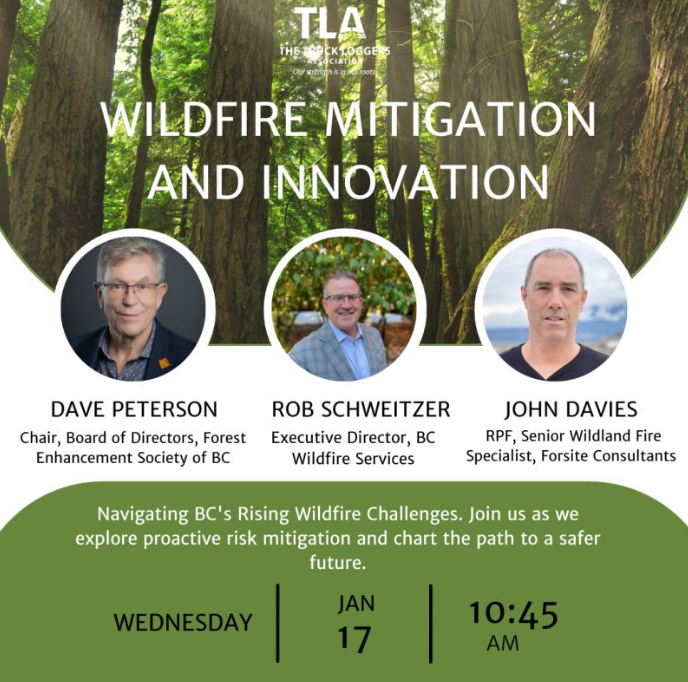In a bid to highlight and address the challenges posed by escalating wildfire frequency in British Columbia, Dave Peterson, Board Chair of the Forest Enhancement Society of BC (FESBC), will be part of a distinguished panel at the Truck Loggers Association (TLA) Convention held in Vancouver from January 17 to 19. The panel will explore the crucial question: “With B.C.’s escalating wildfire frequency in recent years, is it imperative to ask if we can be doing better at risk mitigating and identify the requirements to make that happen?”

Expressing his anticipation for the event, Peterson emphasized the urgency of reassessing and enhancing current wildfire management strategies.
“I am very thankful that the Truck Loggers Association chose to include this panel and topic in the agenda for their annual convention; the urgency of improving our wildfire risk reduction strategies can not be overstated, and this platform provides an excellent opportunity to deliver that message to a wide audience. I am also very thankful that the TLA chose to include me, representing the Forest Enhancement Society of BC, in this panel,” said Peterson.
With a robust career that has included serving as the Chief Forester for the Province of BC and as the President of the Cariboo Lumber Manufacturer’s Association, as well as holding several other senior positions in the forest industry, Peterson brings a wealth of practical experience and industry knowledge to the discussion. Given Peterson’s extensive and distinguished background in forestry, his perspectives during the TLA panel discussion will offer a comprehensive understanding of the issues at hand through the lens of a forestry professional steeped in forestry.
During the panel discussion, Peterson will provide a comprehensive overview of the FESBC’s pivotal role in addressing the escalating wildfire crisis. Known for its commitment to projects focused on wildfire risk reduction and fibre utilization by incorporating sustainable practices, FESBC has been at the forefront of funding projects throughout the province that manage the changing dynamics of wildfires. Peterson will share more about FESBC’s funded projects, exploring an overall potential for improvement and adaptation in the face of evolving challenges posed by climate change.
“I am very proud of the key, unique role that FESBC plays in wildfire risk reduction and believe it is important to communicate that role more broadly. My focus will be on describing the unique role of FESBC in risk reduction and its critical importance in helping B.C. pave the way for a more resilient and sustainable future in the midst of changing climate dynamics and human interaction with our forests,” Peterson added.
Peterson will also be highlighting FESBC’s ongoing efforts to navigate the intricate relationship between climate change, fire intensity, and the evolving human connection with forests. The society is strategically positioned to continue to play a crucial role in raising awareness while funding projects that work to address some of the causes of escalating wildfire incidents in the province.
Visit the FESBC website to get more insights into the work being done by FESBC and its project partners: www.fesbc.ca
